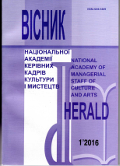GENESIS OF THEORETICAL RESEARCHES OF BANDURA EXECUTIONS
DOI:
https://doi.org/10.32461/2226-3209.1.2016.138497Keywords:
bandura performance, theoretical studies, research papers, kobza, folklore, musical and instrumental heritageAbstract
The article analyses the historiography bandura performance, since its inception in the Cossack's art. Through a chronological distribution of theoretical studies of these topics identified patterns and the relationship between the phenomena studied, characterized by modern lines of research bandura performance.
Performance bandura is a unique phenomenon in the history of not only national but also world music, which has been forming for centuries the best examples of heritage and folk-song-art of stylistically in the works of many local composers and performers.
The historical process conceptualize problems bandura art of Ukraine has been calculating for centuries, absorbed the traditions of folk kobza, which preceded it in historical development. Historical origins bandura performance is a traditional Cossack art, whose roots reach Kiev Russ.
For the first time scientific interest in performing kobza bandura and lyre players emerged among Ukrainian folklorists and ethnographers in the second half of XIX – the first third of XX centuries. Many studies and investigations have dedicated this phenomenon of popular culture. Among them, the work on the development of music culture, music ethnology and national musical language Lysenko, S.Lyudkevych F. Kolessa; development of traditional kobza: D. Revutskiy, Lesya Ukrainka, K. Hrushevs'ka.
The first textbook bandura together to research folk music instruments owned by famous writers, critics, Bandura, teacher G. Khotkevych, which was published in 1909. Known researcher of folklore and musical heritage of the Ukrainian people instrumental K. Kvitka in his scientific heritage left fairly detailed descriptions of musical instruments that were common in traditional peasants in the XIX century. Applying the principle of functional systematization of folk instruments, Kvitka made their classification by groups and types.
In 1930 it came the first thorough work of Ukrainian folk instruments G. Khotkevych "Musical Instruments of the Ukrainian people." In his book, the author thoroughly researched the history of the origin of Ukrainian folk instruments, their distribution in Ukraine and neighboring areas in Russia, Belarus, Poland and other Western countries. The first mdescription of Ukrainian folk instruments on the national territory was made famous composer and performer Lysenko.
Musicologist and folklorist M. Grinchenko explored different genres of folk music, mostly folk songs and dance works, but some attention is given to the author's research and national instrumental music. In particular, the author made a classification of folklore instrumental music on the basis of membership in a particular sphere of existence.
A considerable intensification of scientific research in people's research tool who know and bandura performance observed in the first half of the twentieth century, which is associated with the development of domestic musicology and widespread concert performance. Latitude problem-thematic areas have a high degree of scientific development characterize the development of music in the second half of the twentieth century.
In 1953 it appears first in Ukraine dissertation study on the problems Kobzar culture – M. Shchegolev "Kobzar Soviet Ukraine and s Creativity." Of great importance for Ukraine musical culture of research experience in bandura performance of such famous figures as M. Polotay, V. Kabachok, A. Bobyr, S. Bashtan, M. Opryshko. A number of fundamental works on national instrument sciences, designers bandura, the characteristics of it’s species goes for 60's – early 80-ies. XX century.
However, problems bandura art, performance, education, development of musical and theoretical thought in the field of bandura art constantly needed revision in the light of scientific rethinking the latest contemporary cultural and art concepts.
The national-cultural revival of the late XX – early XXI century, resulted in a significant expansion of the overall range of problem-thematic areas in the national art history and musicology Analysis of research and publications devoted to bandura performance of art as well as musicological character shows that research in this area is incomplete, covering only some aspects of the phenomenon. In particular, the bandura performing considered more a historical perspective (A. Omelchenko, A. Dubas, V. Dutchak, B. Zheplynskyy), in the context of kobza tradition (K. Cheremskyi, V. Churkin, A. Vavryk) performance methodology (Broyako N., N. Morozevich, M. Panasyuk). Mentioned problems in passing concern, researchers in the context of the study of folk instruments and spivotstva (L. Pasichnyak, W. Long, L. Cherkassky, K. Chechenya), the study of the evolution of bandura repertoire (I. Dmitruk, A. Alekseenko). Some works are devoted to personalities of artists (T. Cherneta, A. Vasyuta, L. Kyyanovska, V. Dutchak) and Regional Research (I. Kurovska, N. Chernetskaya, P. Okhrimenko, A. Kidneys, V. Hub'yak).
In modern research bandura art is seen in a broad cultural context, and, above all, as a philosophical and ideological phenomenon, which was a "token" national Ukrainian cultural identity, including the outside of the Fatherland.
Downloads
Published
Issue
Section
License
Authors who publish with this journal agree to the following terms:
1. Authors retain copyright and grant the journal right of first publication with the work simultaneously licensed under a Creative Commons Attribution License International CC-BY that allows others to share the work with an acknowledgement of the work's authorship and initial publication in this journal.
2. Authors are able to enter into separate, additional contractual arrangements for the non-exclusive distribution of the journal's published version of the work (e.g., post it to an institutional repository or publish it in a book), with an acknowledgement of its initial publication in this journal.
3. Authors are permitted and encouraged to post their work online (e.g., in institutional repositories or on their website) prior to and during the submission process, as it can lead to productive exchanges, as well as earlier and greater citation of published work (See The Effect of Open Access).


